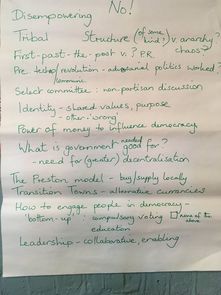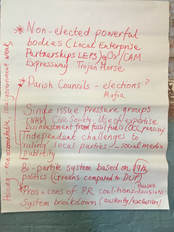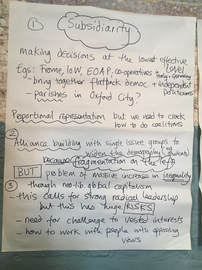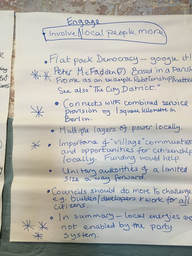Third meeting of the Oxford Democracy Cafe
10th November 2018
10th November 2018
IS THE EXISTING PARTY POLITICAL SYSTEM GOOD FOR DEMOCRACY? was the topic for discussion at the third meeting of the Oxford Democracy Café on Saturday 12 November at a new venue, East Oxford Community Centre. Twenty-three people considered this question, whilst also reflecting on what the following might have to offer.
- Flatpack democracy
- Independent politicians
- Alliance Building
- Cooperative working and shared leadership
- Proportional representation
- Single issue campaigning
The format of the session was, as previously, initial small groups where each person contributed their thoughts before a group discussion. The main points from these discussions (see notes and photos below for more detail) were then taken forward to the plenary.
The present party-political system was generally seen to be disempowering and not good for democracy. As one group summarised it - local energies are not enabled by the party system. Discussions centred on local initiatives and the principle of subsidiarity. Many issues that had been discussed at previous ODCs were raised again and expanded upon as contributors learnt more, and the need for wider education in democracy was clear. In the plenary the issue of the accountability of Parish Councils was raised.
The plenary was followed by a reflection session where the suggestion was made that the ODC should function as a hub, to bring together and nurture the common agendas of the single-issue campaigns that proliferate in Oxfordshire so they can work together for a real ‘people’s’ democracy.
Finally everyone discussed what they were going to do based on the ODC – ideas ranged between talking to more people about democracy, and the ideas raised at the café, to taking direct action through involvement with Extinction Rebellion. Everyone left invigorated and ready to take the ideas forward.
https://en.wikipedia.org/wiki/Subsidiarity
Notes from group discussions
There was a resounding NO to the overall question, with much agreement about Electoral Reform and moving to a system of Proportional Representation where a less adversarial politics might also result. Compulsory voting was favoured by some. The pros and cons of PR were raised, especially the time taken in other European states to agree coalitions. However some thought that this sort of ‘pause’ could be useful in putting projects and spending on hold meanwhile and giving pause for thought about them.
This would be especially helpful in the UK around projects such as the Oxford-Cambridge expressway which few people seemed to want – preferring the promised rail link – and was being driven through against citizens’ wishes by powerful non-elected bodies – LEPS [local enterprise partnerships]. This was seen as a ‘trojan horse’ for further housing and commercial development along a south-east coast and midlands axis.
All groups discussed grassroots democratic forms, with parish councils being a common platform. In at least one case it was seen as the basis for the local ‘mafia’. Participants thought there was potential in ‘capturing’ Parish Councils for more grassroots democracy and discussed ways and means.
Flatpack democracy was popular – see Frome, and the Preston models – as was the idea and examples of co-ops in Italy and Germany, and transition towns. Village communities and opportunities for citizenship locally being important.
Some participants recognised, and were wary of, the way in which the multiple layers of money and power are able to distort democracy. There was a need to engage more people in our democracies at all levels. Education in politics/democracy/civics was important. So was collaborative and enabling leadership.
Tensions were recognised between these grassroots models where local energies were not enabled by the political party system, and the possible need for Unitary authorities [of limited size].
Alliance building was important, as was making links with single issue campaign groups like the Keep Our NHS Public, and Civic Societies.
These were all themes that had come up at previous Cafes.
This would be especially helpful in the UK around projects such as the Oxford-Cambridge expressway which few people seemed to want – preferring the promised rail link – and was being driven through against citizens’ wishes by powerful non-elected bodies – LEPS [local enterprise partnerships]. This was seen as a ‘trojan horse’ for further housing and commercial development along a south-east coast and midlands axis.
All groups discussed grassroots democratic forms, with parish councils being a common platform. In at least one case it was seen as the basis for the local ‘mafia’. Participants thought there was potential in ‘capturing’ Parish Councils for more grassroots democracy and discussed ways and means.
Flatpack democracy was popular – see Frome, and the Preston models – as was the idea and examples of co-ops in Italy and Germany, and transition towns. Village communities and opportunities for citizenship locally being important.
Some participants recognised, and were wary of, the way in which the multiple layers of money and power are able to distort democracy. There was a need to engage more people in our democracies at all levels. Education in politics/democracy/civics was important. So was collaborative and enabling leadership.
Tensions were recognised between these grassroots models where local energies were not enabled by the political party system, and the possible need for Unitary authorities [of limited size].
Alliance building was important, as was making links with single issue campaign groups like the Keep Our NHS Public, and Civic Societies.
These were all themes that had come up at previous Cafes.





